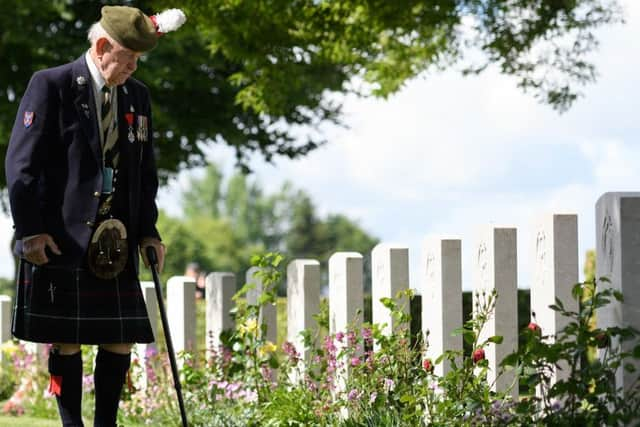We owe it to the ‘greatest generation’ to create country fit for heroes – Christine Jardine
What must she have gone through that morning 75 years ago when she heard that the operation to liberate occupied Europe had begun? Both sons were in the army.
Then, a few days later she opened the telegram that explained her eldest son was missing.
Somewhere in France.


Advertisement
Hide AdAdvertisement
Hide AdIf you have ever read one of those communications they are the most achingly empty, and yet at the same time heart rending, pieces of writing.
They convey a pain I can only imagine, but watching that ceremony on Thursday, I thought about how that pain had been sadly commonplace 75 years ago.
That son, my Mum’s big brother Andrew had, like so many of his generation, volunteered to put himself in harm’s way to safeguard those things we now take for granted.
I’m not ashamed to admit that I shed a tear when Theresa May so appropriately expressed what so many of us feel, when she described them as ‘the greatest generation’.
But I also found myself wondering if the words of thanks, important though they are, fall so far short of what we really ought to dedicate ourselves to in their memory.
For my family the invasion of France had the happiest, and most fortunate, of outcomes when another message arrived to say that Andrew had been wounded but was safe.
But growing up I was surrounded by aunts, uncles and family friends who had not been so lucky.
Whose parents had been lost to them, in some cases either before they were born or before they had the chance to enjoy even one brief, cherished, encounter.
Advertisement
Hide AdAdvertisement
Hide AdThey are in their later decades themselves now and I often wonder what they think of what we are making of the world they lost their parents for.
What do they think of a country where food banks have become commonplace, for some their grandchildren and great grand children live in poverty and now even the NHS, that shining beacon of post-war British pride may, or may not, be up for sale to the United States?
And what about those who were born in the immediate post war years to parents who had survived the carnage? What are they thinking now?
Many of those children of war heroes are the generation caught up in the implications of the demographic bubble that was the inevitable consequence of the postwar baby boom.
They are the ones now being punished by the shortage of funds for their social care.
The taxes and national insurance they willingly paid now, in many places, no longer stretches to the cradle to grave care that the welfare state that grew up alongside them had promised.
Some have even been caught up in the financial trap that was sprung on the so-called WASPI women.
Born in the early 1950s they worked all their lives expecting to retire at 60, only to find their pensions moved out of their reach just when they were planning to enjoy their retirement.
Advertisement
Hide AdAdvertisement
Hide AdI cannot be the only one who was struck by the irony of the case being brought by some of those women against the state for depriving them of their pensions by mismanagement, coming to court in the same week that their parents’ sacrifice for that state is being recognised.
My generation have been spared the horrific experiences endured by those of both world wars.
Of the years when the battle field extended to civilian communities across each country devastated by aerial bombing.
Yes we have known financial crises, wars in the Falklands and the Gulf and the near constant threat of terrorism from one foe or another.
And now we have Brexit.
But all of that pales into insignificance in comparison.
What we do have, by contrast, and what was spelled out in the clearest terms possible this week, are the opportunities that were created for us.
My uncle’s war record was a source of enormous pride to every generation of our family. Enlisting as a private at the outbreak of war he eventually left the army a major. He and my other uncle raised four children between them in that ‘country fit for heroes’ to which they came home.
And that is why, while I agree with every syllable of the sentiment expressed both by the Queen and by the Prime Minister this week, there is something I would like to add. Our responsibility to honour and respect that sacrifice is not fulfilled solely by monuments and words of thanks.
We also owe it to them to provide a system of welfare that will catch and safeguard their descendants without question when they fall into hardship.
Advertisement
Hide AdAdvertisement
Hide AdBy building international alliances and treaties to safeguard both the peace we’ve enjoyed and the planet’s climate we can show respect for what they fought for.
And, for those of us in a position of political or any other influence, only by putting the national and social interest before any other ideological or economic consideration do we live up to the promises they were made. Then perhaps we will measure up to the example of that ‘greatest generation’.